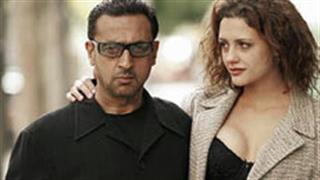Kishore Kumar would have been 78 Saturday, but chances are that the irrepressible, versatile playback
singer-actor would still have been yodelling away like he did so many decades ago in the title track of
"Jhumroo" had he been alive.
His was the voice that gave us unforgettable moments in the joyous "Paanch Rupaiya Baara Aana", the soulful
"Zindagi Ka Safar", the romantic "Pal, Pal Dil Ke Pas" and the foot tapping "Eena Meena Deeka" that has
people doing the twist even 50 years later.
They say there can never be another Kishore Kumar, and they are probably right. Where else would you get
not just the voice but also the actor who made you laugh and cry with his tomfoolery and intensity. Just take
the hilarious theatre guru in "Padosan" and the sombre "Door Gagan ki Chaon Mein" as cases in
point.
The singer-actor died of a heart attack on Oct 13, 1987, leaving behind legions of followers - and
imitators.
Music composer Bappi Lahiri gets emotional when talking about the legend, often known to be mercurial
particularly in his later years.
"He is an irreplaceable and immortal singer-composer-actor-comedian-performer. There won't be any Kishore
Kumar ever again. He cannot be compared to anyone. Just like legendary singers like Elvis Presley,
Mohammad Rafi and Lata Mangeshkar, he has no comparisons," Lahiri told.
Many budding composers wish they had a chance to work with him.
Said Neel Dutt, music director of "The Bong Connection": "I regret I will never get a chance to compose a song
for him. Though he is not with us today, Kishore Kumar lives in every singer. He has been an inspiration for
anyone and everyone related to music."
Added Vinay Tiwari of the Nikhil-Vinay duo: "Kishore Kumar was a genius and is the biggest lost suffered by
the Hindi film industry. No one can match his calibre. His work makes the audience cry and laugh even
today."
Bollywood superstar Shah Rukh Khan once said he would have liked to make a film on Kishore Kumar's life -
encapsulating on screen his remarkable rise as a playback singer despite no formal training and his
fascinating personal life too. Kishore Kumar married four times, to Ruma Devi, Madhubala, Yogita Bali and
Leena Chandravarkar.
Born as Abhas Kumar Ganguly in Khandwa on Aug 4, 1929, Kishore's journey to success was not easy, even
though he got a foothold into the industry thanks to elder brother Ashok Kumar who was already a star when
he moved to Mumbai at the age of 18.
The first break came easily -- "Marne ki duayen kyon mangu" for Dev Anand in Bombay Talkies "Ziddi"
(1948).
The K.L. Saigal influence was audible and the song became a hit, but it didn't bring too many offers.
Composer S.D. Burman, who was a friend of Ashok Kumar, took time to advise the youngster: "Don't try to
ape K.L. Saigal. Apers never make great artistes. You should develop your own singing style."
Kishore listened, and developed his trademark singing style -- the distinctive yodelling, which he learnt by
listening to the Austrian records of his brother Anoop Kumar and used to such great effect in "Main Hoon
Jhum, Jhum, Jhumroo" and "Zindagi Ek Safar Hai Suhana", still has no match.
Burman, in fact, gave him many of his hit songs like "Maana Janaab Ne Pukara Nahin" in "Paying Guest", and
"Badi Sooni Sooni Hai" in "Mili".
Singing was his first passion but Kishore was forced to accept acting assignments when he married Ruma
Devi against his family's wishes and found himself isolated. "Aandolan" (1951) was his first film as an
actor.
The film flopped, but he went on to also become known as an actor. Some of his memorable films are "New
Delhi" (1956), "Asha" (1957), "Chalti ka Naam Gaadi" (1958), "Dilli ka Thug" (1958), "Chacha Zindabad" (1959),
"Jhumroo" (1961), "Half Ticket" (1962), "Door Gagan ki Chaon Mein"(1964), "Mr. X in Bombay" (1964) and
"Padosan" (1968).
He sang his own songs in all these films.
His was the voice that gave stars like Dev Anand and Rajesh Khanna their screen identity.
He sang for Dev Anand in "Guide" to great success, but the real turning point came when he teamed up with
Rajesh Khanna in "Aradhana" (1969).
Among his memorable songs are "Haal kaisa hai janaab ka" from the 1958 hit "Chalti ka Naam Gaadi", "Yeh
raatein, yeh mausam" ("Dilli ka Thug"), "Aa chal ke tujhe" ("Door Gagan ki Chaon Mein"), "Mere mehboob
qayamat hogi" ("Mr. X in Bombay") "Mere saamne wali khidki mein" (Padosan), "Mere sapnon ki Rani"
("Aradhana"), "Woh shaam kuch ajeeb thi" ("Khamoshi"), "Aaye Tum Yaad Mujhe" ("Mili"), "Chingari koi
bhadke" ("Amar Prem"), "Zindagi ek safar hai suhana" ("Andaaz") "Chala jata hoon" ("Mere Jeevan Saathi"),
"Musafir hoon yaron" ("Parichay"), "Main shair badnaam" ("Namak Haram") and "Zindagi ke safar mein" ("Aap
ki Kasam").
Kishore Kumar - still the voice for all moments
Saturday, August 04, 2007 14:27 IST



















